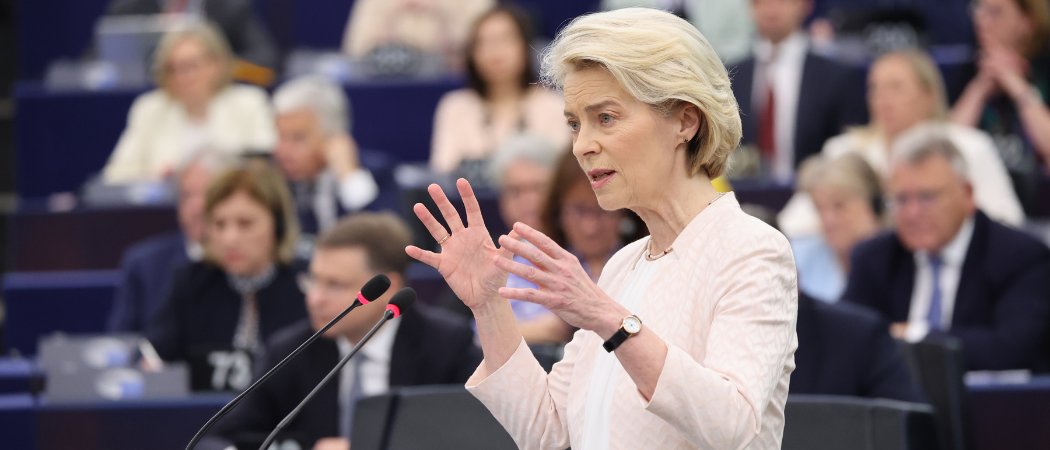Industry welcomed Commission President Ursula von der Leyen’s plans for more climate investments, but environmental groups are not convinced

Commission president Ursula von der Leyen giving her speech before the European Parliament in Strasbourg ahead of her re-election. Photo credits: Christophe Licoppe / European Union
The clean tech industry is breathing a sigh of relief after Ursula von der Leyen was elected for a second term as president of the European Commission 18 July with a renewed commitment to climate action.
Tightening public belts, a growing focus on defence spending, and an influx of new far-right MEPs have led to fears that von der Leyen’s signature Green Deal climate policy would fall by the wayside. But ahead of the vote in the European Parliament, the Commission president set out her vision for the next phase of the Green Deal, focused on implementation and investment.
“This will be an investment Commission,” she promised in her political guidelines published on Thursday. Green investments are at the heart of that strategy, as she promised to unveil a Clean Industrial Deal in the first 100 days of her mandate.
This will include investment in clean energy infrastructure and technologies, simplification measures for business, and an Industrial Decarbonisation Accelerator Act to support energy-intensive sectors in the green transition.
Von der Leyen also called for a European Competitiveness Fund to invest in strategic technologies, including clean tech; for measures to address barriers to the Single Market to keep innovative start-ups in Europe; and for increased spending on research and innovation.
For now, many of the proposals are short on detail, with no mention of possible sums. Next year, von der Leyen says she will propose a “reinforced” long-term EU budget from 2028, but this will be subject to difficult negotiations with member states, and other sources of funds will have to be found in the meantime.
Industry lobby groups were reassured by the Commission president’s agenda. “It is encouraging to see that the core of the next mandate revolves around high climate ambitions with a clear framework for EU net zero industrial investments that will help derisking business decisions needed to deliver climate neutrality by 2050,” Hydrogen Europe said in a statement.
The commitment to implementing the Green Deal is “good news for Europe and for the energy transition,” said Walburga Hemetsberger, CEO of SolarPower Europe. “We’re pleased to see the new EU Clean Industrial Deal, reflecting our June letter supported by over 550 signatories from across society and the economy.”
Environmental lobby group Transport & Environment (T&E) welcomed the commitment to enshrine the 90% emissions reduction target for 2040 in EU law, but expressed concerns for the future of the 2035 ban on selling CO2-emitting cars. Von der Leyen plans to maintain that target, but amend the regulation to allow e-fuels derived from captured carbon dioxide.
“Opening the door to e-fuels for cars under the false flag of technology neutrality, is a major threat to investment certainty, especially with significant battery investments currently at risk,” said Julia Poliscanova, senior director at T&E. “Spending years designing a policy framework for niche e-fuels is a distraction from the monumental task to secure clean and competitive EV supply chains.”
Huge investment needed
For the Paris-based Institute for Climate Economics, investing in a green industrial base by using existing instruments and by replacing the “underwhelming” Strategic Technologies for Europe Platform with a European Competitiveness Fund is the right approach.
“While efforts at green industrial policy have so far faltered, the EU has the tools in place to do better, whether through the carbon market-funded Innovation Fund or the support offered by the European Investment Bank,” it wrote in a blog post.
However, it warns that closing the investment gap will be a major challenge, particularly as EU and national budgets come under pressure. European green investments grew by 9% to reach €407 billion in 2022, but annual investments need to double to reach Europe’s 2030 climate goals, according to the think tank’s calculations.
Environmental concerns
While environmental groups were also relieved to learn the EU’s climate targets are here to stay, they are concerned the focus on competitiveness will overshadow climate action.
“Ursula von der Leyen hasn’t thrown the Green Deal overboard, but she presented an agenda for her second term which is lacking in concrete measures and major new initiatives,” said Greenpeace’s EU director Jorgo Riss. “Her agenda bears the imprint of big business interests and will lead to more neocolonial resource competition, pollution and exploitation of people and ecosystems.”
Chiara Martinelli, director at Climate Action Network Europe, said the European industrial base will play a vital role in reaching climate neutrality, but support for private companies should be conditioned on social and green commitments.
“An industrial deal can only be considered as ‘clean’ if it moves towards circular consumption and production patterns within planetary boundaries, is based on renewables and explicitly closes the door for all fossil fuels,” she said.
Clean tech is not the only strategic sector that would receive support from the EU Competitiveness Fund. Von der Leyen also namechecked biotech, artificial intelligence, and space.
Claire Skentelbery, director of industry association EuropaBio, welcomed the focus on biotech. “As a critical technology where the EU already has significant scientific and economic strength, we look forward to strong progress and delivery towards the EU ambitions of competitiveness and resilience,” she said.





 A unique international forum for public research organisations and companies to connect their external engagement with strategic interests around their R&D system.
A unique international forum for public research organisations and companies to connect their external engagement with strategic interests around their R&D system.